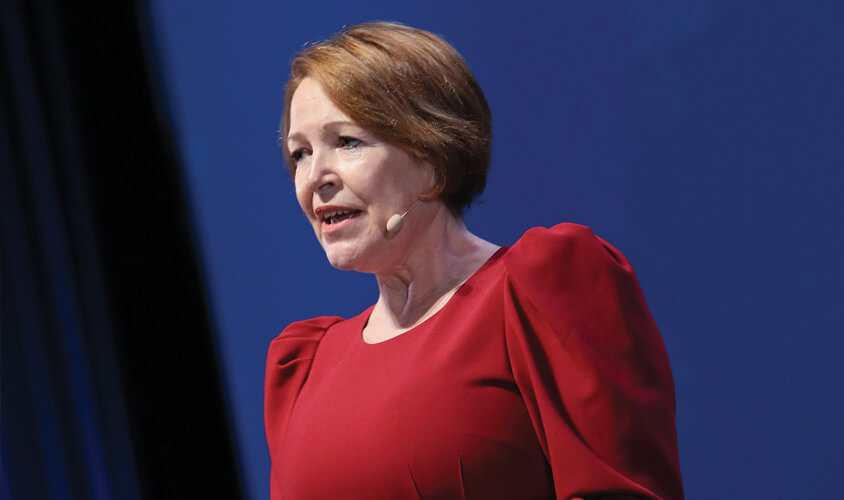O’Sullivan Shares Secrets to Her Success
When Nóirín O’Sullivan, currently the United Nation’s assistant secretary-general for safety and security, began her career with Ireland’s police force back in 1981, the uniform code for female officers was rather strict: a skirt paired with the short stiletto shoes known as kitten heels.
“Trying to chase around a criminal in kitten heels doesn’t go very well,” she said with a laugh during an interview with the GSX Daily, conducted immediately after O’Sullivan made brief remarks at the GSX 2019 General Session on Monday.
Wearing a uniform not ideally suited for police work wasn’t O’Sullivan’s only challenge. Up to 1979, Ireland maintained a marriage ban that forced women to leave public service upon matrimony. That helped make An Garda Síochána, the Irish police service, a nearly exclusively male organization when she joined—significantly less than 1 percent female. The few women on the force were usually consigned to administrative roles.
Still, she persisted: she wanted to work in operations. So, she started working in a undercover unit (“mockies,” in the local parlance) with several male officers.
“I found that in the area I grew up, the police made a real difference, and I wanted to make a difference,” she said.
And O’Sullivan has. After shooting up the ranks, she became garda commissioner of An Garda Síochána, responsible for leading a worldwide force of 16,000 officers and other personnel.
She attributes her success to two factors. The first is strong self-belief.
“You really have to believe in yourself,” she said. “Police training is tough, and you have to keep striving to be your very best.”
The second is immediately making a strong effort to establish credibility with male peers.
“You have to be able to demonstrate that you are able to bring added value. And that does speak to the saying that women have to work a bit harder,” she explained.
O’Sullivan also advises aspiring female leaders to be “assertive without being arrogant,” and to be open with their career ambitions, rather than trying to hide them.
Also key to her success was a continued drive for professional development and knowledge. O’Sullivan did not have a university degree when she joined the police force, so she went to night school and worked her way through several degree programs, including the equivalent of an MBA degree with a focus on management and strategy.
And one of her habits that helped her professionally is her years-long practice of trying to meet three new people, and learn three new things, every day. She writes the new ideas down in a journal, so she doesn’t forget them.
When O’Sullivan took over as garda commissioner in 2014, the service’s public approval rating had dipped considerably. She led an initiative to improve it, using methods like public and internal surveys, town hall meetings, increased visibility, and better communication. And the gender balance of the force has improved from almost no women when she started to a one that is now about one-quarter female.
Once O’Sullivan retired from the service in 2017, the United Nations approached her. She found that much of her work as a law enforcement leader working on international initiatives was great preparation for the global work of the United Nations.
“The U.N. is grappling with the global complexity that we are all dealing with,” she said.
In her current position as assistant secretary-general, she serves as deputy to the under-secretary-general for safety and security (USG/DSS). She is responsible for the day-to-day overall management of the safety and security department (UNDSS), and for supporting the USG in the overall leadership and management of the department.
As a U.N. security manager, O’Sullivan said she and her department face challenges that are common to many other security managers.
For example, her department is trying to push for an operational shift so that security is not an “add-on” to initiatives that have already been launched, but a participant in their formation. “We still have work to be done in that area,” she said.
Currently, the United Nations continues to make a push for greater diversity, and Secretary-General António Guterres is committed to achieving a 50/50 gender balance in the U.N.’s workforce “ASAP,” O’Sullivan said.
Her department, UNDSS, has incorporated gender perspectives into all U.N. Security Management System training curricula. Gender security awareness training, as well as a women’s security awareness training, is delivered by women security professionals for other women and aims to improve security awareness, understanding, and capability.
UNDSS also supports an initiative called Saving Lives Together (SLT), which provides a framework of cooperation with international non-government organizations that face similar security challenges when operating in volatile environments.
